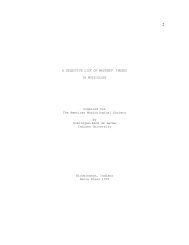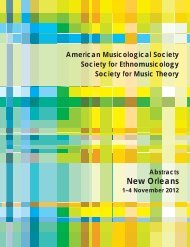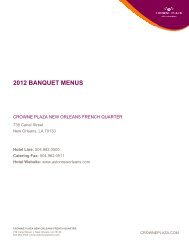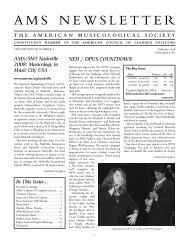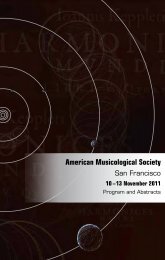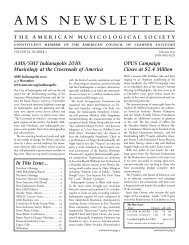AMS Philadelphia 2009 Abstracts - American Musicological Society
AMS Philadelphia 2009 Abstracts - American Musicological Society
AMS Philadelphia 2009 Abstracts - American Musicological Society
Create successful ePaper yourself
Turn your PDF publications into a flip-book with our unique Google optimized e-Paper software.
100 Friday afternoon <strong>AMS</strong> <strong>Philadelphia</strong> <strong>2009</strong><br />
OPPOSING THE HYBRIDS: NICOLAS NABOKOV, ALAIN<br />
DANIéLOU, AND THE MUSICAL COLD WAR<br />
Harm Langenkamp<br />
Utrecht University<br />
In the spring of 1961, Tokyo provided the stage for what was announced as “a confrontation<br />
of unprecedented breadth and significance in the history of music”: the “East-West Music<br />
Encounter.” Organized as a conference-festival, nearly a hundred composers, musicologists<br />
and music critics from Western Europe, the United States, and various parts of Asia discussed<br />
problems of cross-cultural understanding and contemporary musical life during the day, and<br />
by night reveled in high-profile performances of, among others, the New York Philharmonic,<br />
the NHK Symphony Orchestra, and prominent interpreters of Indian, Thai, Korean, and<br />
Japanese traditional music. The driving spirit behind the Encounter was Nicolas Nabokov,<br />
composer and secretary-general of the Congress for Cultural Freedom (CCF), a worldwide<br />
coalition of intellectuals united from across a broad political spectrum in a network of committees<br />
and institutions which had been founded in the early 1950s with the stated aim of<br />
defending artistic and intellectual freedom against totalitarian oppression, and which would<br />
be exposed in the mid-1960s as a CIA instrument designed to lure non-aligned intellectuals<br />
away from the blandishments of Soviet-style Communism.<br />
Predicated on the conviction that “the preservation of the various traditional systems of<br />
music” had become a “world problem,” the conference adopted an outline of what would<br />
become the International Institute for Comparative Music Studies. Founded in 1963—with<br />
support from the Ford Foundation—in the enclave of the “free world,” West Berlin, and led<br />
by one of Nabokov’s creative partners, the Indologist Alain Daniélou, the Institute devoted<br />
its resources to the study of “the practical means of integrating the musical achievements of<br />
Asian and African cultures into world culture” in an effort to oppose “the influence of hybrid<br />
forms of music” that (supposedly) constituted a threat to “the continuation and preservation<br />
of authentic traditions.”<br />
Based on archival research and the correspondence between Nabokov and Daniélou, this<br />
paper discusses the troublesome gestation of the Encounter and the Institute against the political<br />
background of the late 1950s and early 1960s: the global competition between the United<br />
States and the Soviet Union for the allegiance of decolonizing nations in Asia and Africa,<br />
the foundation of the Non-Aligned Movement led by India, and a wave of anti-<strong>American</strong><br />
demonstrations in Japan. The CCF’s investment in musico-cultural preservation will be interpreted<br />
as a strategy to win over the intelligentsia of what in 1952 had been coined the “Third<br />
World” for the “First World.” Subsequently, it will be argued that this strategy emerged from<br />
a general concern for what many CCF members saw as the threat of “middlebrow culture,”<br />
the type of media which emphatically encouraged accessibility and hybridization, and which<br />
was, therefore, much to the distress of Nabokov, deployed by the Eisenhower administration<br />
for its cultural diplomacy programs. By considering the various, and at times conflicting,<br />
agendas held by participants, institutions, and sponsors engaged in “East meets West” events,<br />
this study aims to contribute to the wider debate on both enabling and disabling tensions of<br />
globalization that to a large extent emanated from Cold War ideology and taste politics.



